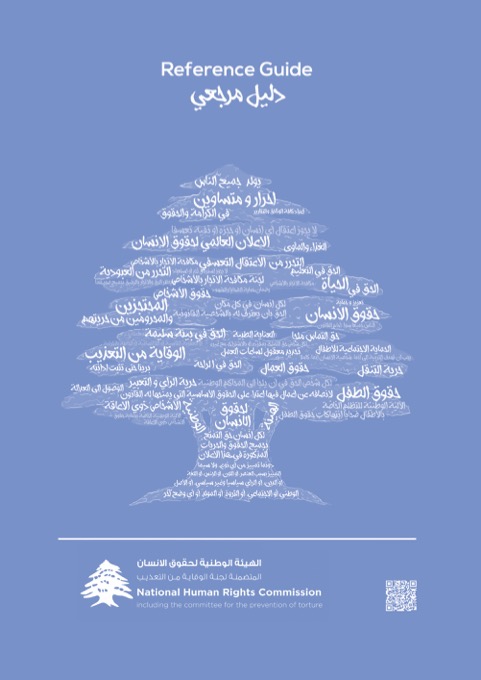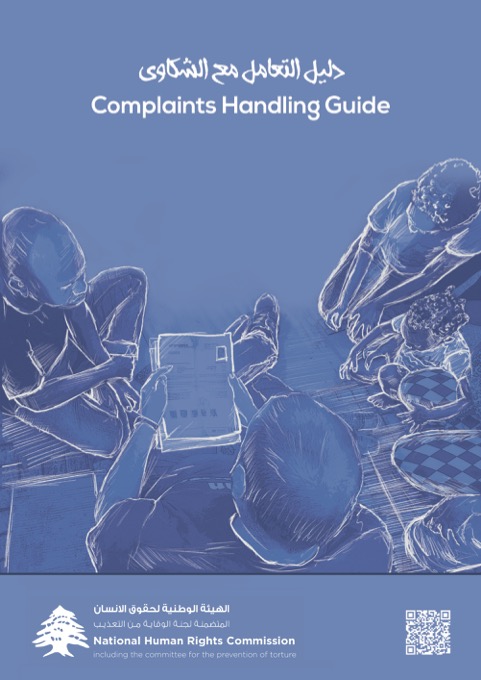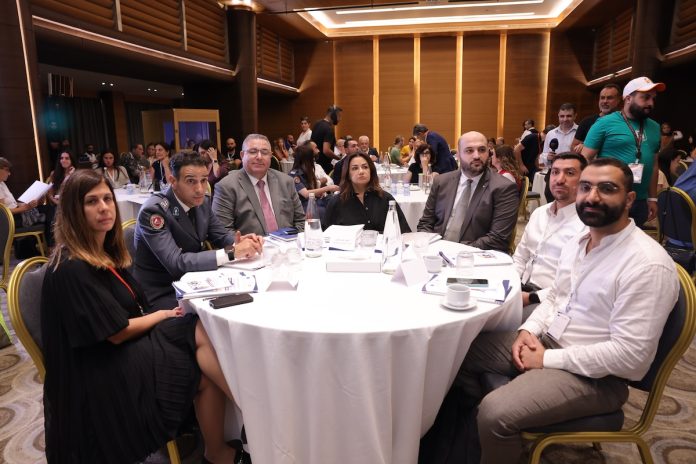Beirut today hosted the first national conference to develop an inclusive emergency plan for persons with disabilities in Lebanon. The event was organized under the EU-funded BINA’ project, led by Transparency International and the Lebanese Transparency Association, in partnership with Arcenciel and the Ministry of Social Affairs, with wide participation from Lebanese ministries, UN agencies, humanitarian organizations, and organizations of persons with disabilities (OPDs).
The conference responded to the serious gaps revealed during the 2024 hostilities, when persons with disabilities were among the most marginalized and least served in humanitarian response and access to essential services. Notably, the 2023 national emergency plan did not include specific measures for this group.
In her welcome remarks, Lody Hakim Samra of Arcenciel reaffirmed the organization’s commitment to equal access to information and services throughout the conference, including real-time interpretation and sign language. She emphasized that this gathering bridges the National Inclusive Emergency Response Plan for Persons with Disabilities and the Ministry of Social Affairs’ emergency plan, to close the gaps that left many people with disabilities outside protection services during crises. She thanked participating ministries and donors—especially the European Union under BINA’—and members of the Emergency Taskforce for Persons with Disabilities for their efforts to develop and revise the plan to make it truly inclusive.
Ibrahim Abdallah, a human rights advocate and expert on disability inclusion in humanitarian action, presented a prototype for a national inclusive plan on behalf of the Emergency Taskforce for Persons with Disabilities. He stressed the goal of integrating the rights and needs of persons with disabilities from planning through reconstruction. He noted that this step forms part of a broader national reform track that includes Lebanon’s ratification of the Convention on the Rights of Persons with Disabilities (CRPD), adoption of the National Social Protection Strategy, and ongoing work on a new National Strategy for the Rights and Inclusion of Persons with Disabilities in collaboration with UNFPA. He called for a broad national coalition to ensure a comprehensive response that leaves no one behind.
Ministerial Statements
Dr. Rakan Nasreddine, Minister of Health, stated:
“We meet today after a harsh and bloody year marked by the brutal Israeli aggression against our country, which spared no one. Sadly, many people were forcibly added to the population of persons with disabilities due to physical and psychological war injuries. This reality places a double responsibility upon us.”
He added:
“Experience has shown that responses often fail when designed without the most vulnerable at the center—first among them persons with disabilities. Launching an inclusive emergency plan for disability today is not just a technical document; it is a national declaration of intent and a message of ethical, humanitarian, and rights-based commitment.”
He underscored three core messages: (1) disability is not a marginal issue but an urgent priority; (2) health is incomplete without cross-sectoral coordination; and (3) no plan about disability without the participation of persons with disabilities.
Haneen Al-Sayyed, Minister of Social Affairs, said:
“This plan is the product of tireless efforts by civil society and partner organizations. At the Ministry of Social Affairs, we will officially adopt it within the National Strategy for the Rights and Inclusion of Persons with Disabilities, because the voices of persons with disabilities must be at the core of any national plan.”
She added that the broad presence of ministries, organizations, and agencies is “a message of hope that, despite challenges, Lebanon can build a more inclusive and just crisis-management system that puts people first,” recalling that persons with disabilities were among the most marginalized during the recent war—whether in shelter, health services, or essential assistance.
Minister Al-Sayyed praised local NGOs and international partners for emergency services and shelter and concluded:
“We will no longer accept that persons with disabilities remain at the margins during emergencies. This plan marks the beginning of a change in mindset and practice. The Ministry of Social Affairs is committed to ensuring the voices of persons with disabilities are at the heart of any national plan or reconstruction process, because justice is not achieved if anyone is left behind.”
Representatives of the Lebanese Transparency Association noted that the collaboration with Arcenciel is the second initiative under the EU-funded BINA’ project, aiming to develop inclusive emergency response plans that prioritize the rights of the most marginalized from the planning stage—especially during crises, when risks of exclusion are highest. They highlighted work with more than 25 civil society organizations across Lebanon to advance urgent national and local reforms through participatory advocacy grounded in transparency and good governance.
Technical Presentations
Dr. Itab Choueib, specialist in universal design and head of the Disability & Inclusion pillar at the Lebanese Center for Policy Studies (Disability Hub), presented the National Inclusive Emergency Response Plan for Persons with Disabilities. She detailed the significant gaps seen during the 2024 war, when many persons with disabilities were denied shelter, health care, and essential support. The plan aims to integrate persons with disabilities across all emergency phases—preparedness, response, and recovery—through sectoral pillars covering health, shelter, education, water and sanitation, protection, food security, and essential services. It is anchored in accessibility, universal design, and the principle of “Nothing About Us Without Us,” ensuring participation of persons with disabilities in planning, implementation, and the creation of sustainable coordination and accountability mechanisms.
In parallel, Dr. Dolly Bassil, public health and development expert, presented the Ministry of Social Affairs’ National Emergency Plan for Persons with Disabilities, developed with Arcenciel under BINA’. She described the plan as a pioneering national step to mainstream disability into crisis response, drawing on lessons from major shocks—the Beirut Port explosion, COVID-19, and the 2024 hostilities—that exposed severe marginalization of persons with disabilities.
The plan seeks to safeguard the lives and safety of persons with disabilities across all emergency phases, ensure inclusive access to humanitarian assistance, health care, rehabilitation, and social protection, and build institutional capacity with systems for coordination, accountability, and continuous learning within the Ministry and with partners. Practical components include: establishing an emergency cell within the Ministry; updating the national registry disaggregated by type of disability; equipping accessible shelters; evacuation and transportation protocols; accessible communication systems; and training for Ministry and municipal staff on inclusive response—guided by accessibility, universal design, and “Nothing About Us Without Us.”
Key Recommendations Adopted
-
Integrate persons with disabilities across all phases of emergency management in national and local plans.
-
Establish a permanent emergency cell within the Ministry of Social Affairs to coordinate with ministries, municipalities, and humanitarian actors.
-
Create a national, disability-disaggregated data system.
-
Ensure accessible shelters and train response teams and municipalities on inclusive practices.
-
Allocate clear disability budget lines in emergency financing.
The conference concluded that this plan marks a turning point in placing disability at the center of national emergency planning. It represents a historic step toward building a fair and inclusive humanitarian response system in Lebanon—placing persons with disabilities at the heart of emergency planning rather than leaving them at the margins.
هذه المقالة متاحة أيضًا بـ: العربية (Arabic) Français (French)



